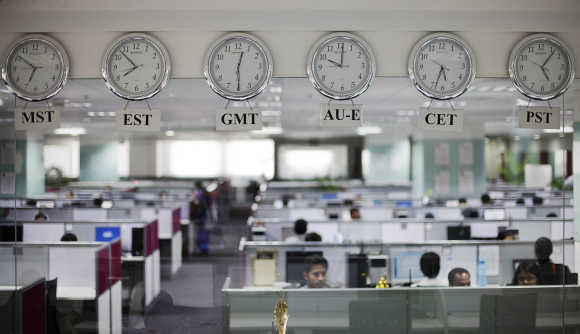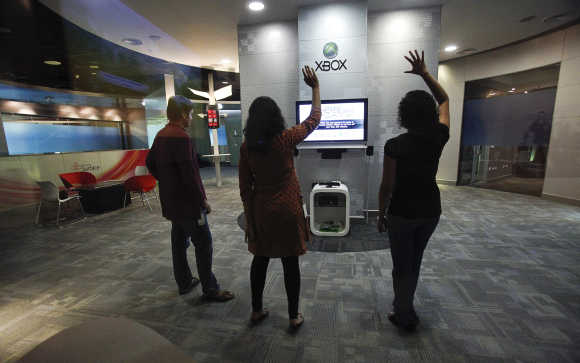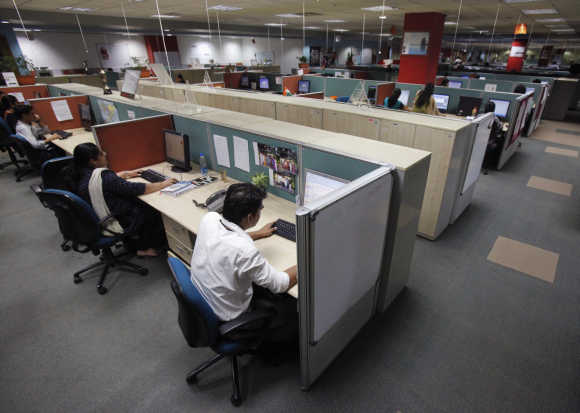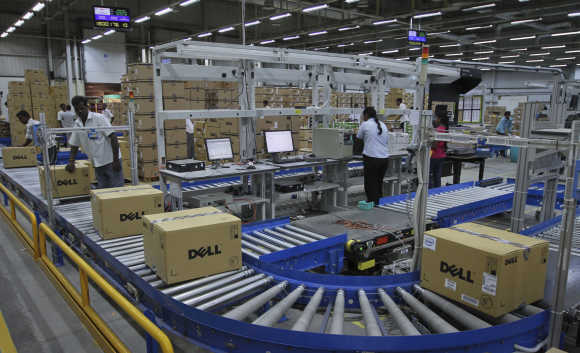Photographs: Parivartan Sharma/Reuters Shyamal Majumdar in Mumbai
Conventional wisdom says when companies are slashing budgets across the board to weather the economic downturn, senior executives would have better things to do than talent management (jargon for keeping the people you want engaged).
The logic is that that's something you do when the going is good, not when you know that they have nowhere to go in this crummy job market.
This stereotypical thinking has been turned upside down by a Monster India study released last week.
The study said one out of every three CEOs is spending more than half of his or her time on talent-related activities, indicating the willingness to change people strategies to compete and win in a new business reality.
...
Companies should hold on to talent during slowdown
Image: Talent is one of the three main drivers for strategic change that CEOs are looking for.Photographs: Vivek Prakash/Reuters
Also, 75 per cent of human resources, or HR, heads report directly to CEOs, signifying a transition in HR's role in the boardroom.
The 14th Annual Global CEO survey by PricewaterhouseCoopers this year also identifies talent as one of the three main drivers for strategic change that CEOs are looking for.
There's more. John Sullivan, a well-known thought leader in HR, says companies are going that extra mile to woo talent. For example, recently a recruiting firm sent 150 cookie-baskets to key employees at Zynga - a social game developer.
...
Companies should hold on to talent during slowdown
Image: Some companies are going to great lenghts to hire people.Photographs: Vivek Prakash/Reuters
It didn't send the baskets to employees' homes, but directly to the office so that the gesture would have maximum impact and let every employee know that he or she is wanted by other firms.
Similarly, another firm got a van with a "We are hiring" banner to drive continually around the building of its "target" competitor to entice its employees into leaving.
The shortage, Sullivan says in his blog, is not of the number of people available (there may be many), but of the number of people who have the required advanced skill-sets.
...
Companies should hold on to talent during slowdown
Image: Majority of companies are not hiring during slowdown.Photographs: Vivek Prakash/Reuters
But if all these surveys and examples make you think that companies are taking talent management seriously during the current slowdown, the reality is different.
CEOs may do public posturing to mask their private thoughts in surveys, but the fact is that a majority of companies are still sticking to the conventional wisdom of not hiring (forget talent management) during a slowdown.
This despite the fact that such knee-jerk reactions have often boomeranged in the past. Worse, most are falling into the trap of thinking that they can afford to ignore such things for the time being since people have nowhere to go.
...
Companies should hold on to talent during slowdown
Image: Most CEOs often have a silo vision.Photographs: Stringer/Reuters
Most CEOs often have a silo vision - focusing only on the interests of one section of the organisation rather than the whole organisation.
This not only hinders the mobility of talent within a company, but also undermines sharing of knowledge and the development of interpersonal networks across the organisation.
What they forget is that this approach gives rise to a feeling of economic and psychological vulnerability and a growing sense that your employer does not care about you.
This is the time when leaders should talk straight and listen with empathy to the concerns of the team. By not communicating, they are asking people to walk straight into the storm.
...
Companies should hold on to talent during slowdown
Image: It's important to be fair when laying off employees.Photographs: Vivek Prakash/Reuters
It will crush them - privately, silently, but inevitably. HR experts say lay off people - if you must - but it is important to be perceived to be fair, and that can be done only by communicating the facts clearly and frankly.
The company must talk about the reason because of which it is in a bad situation and, most importantly, its plan for getting out of it? This is important as pink slips make the situation worse by creating another set of worries for employees: "Why did I survive?" and "Will I be next?" Those who have not been laid off need to be told that their survival was not a matter of luck.
They also deserve to know why and how they survived and how they fit into the recovery plan.
...
Companies should hold on to talent during slowdown
Image: Taking care of talent has economic logic too.Photographs: Babu Babu/Reuters
Companies that don't do this often see people leave, even the ones they would have wanted to keep. For, employees might not have the same number of job options in the market as last year, but high-caliber professionals are always in demand.
Unfortunately, the challenge of holding on to a good workforce and keeping employees motivated doesn't go away in a recession. While the immediate risk of people quitting certainly declines, the chance that employees could become demoralised and less productive, and jump ship when the economy improves is important to recognise.
Taking care of talent has economic logic too. Surveys have shown compelling evidence that better talent management pays for an organisation.
...
Companies should hold on to talent during slowdown
Image: The monetary implication of this is huge.Photographs: Vivek Prakash/Reuters
For example, employee turnover in Indian firms doing a better job of attracting, developing and retaining highly talented people is 45 per cent less than that of others.
The monetary implication of this is huge since a frontline employee in a top company costs 40 per cent of his or her salary to replace and one in top management costs 150 to 200 per cent of salary to replace.
Moreover, a decade-long engagement score of the "best" and the "rest" reveal that the score for "best" employers have been over 80 per cent, while that for the "rest" range between 50 and 60 per cent.










article